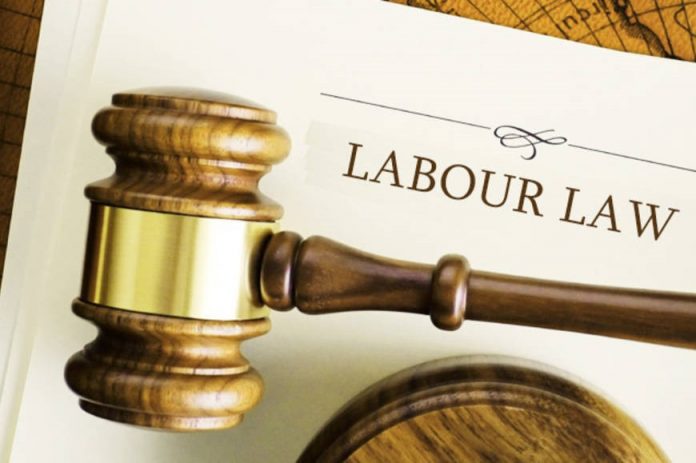We are thought to see law as a set of rules, often written and meant to uphold a certain order. This order which law upholds protects some societal principles with penalty for defaulters. But a pertinent question for us as workers is this; is the law neutral? Related to this is another question; do members of the ruling class who formulate law as legislators and execute them as politicians in public life or private employers in the world of work always respect the laws they formulate and are supposed to defend?
The evidence available points towards the answer to both questions as NO! For example, the labour law in Nigeria makes it illegal for any employer not to pay employees by or before every thirty days. But governors in at least two thirds of the states of the federation have failed time and again to pay workers their wages as and when due. There are some that have defaulted in paying salaries for upwards of a year.
None of these governors have been charged to court, not to talk of being made to face the wrath of the law. However, if a worker were to go against the law in anyway, she or he is immediately prosecuted. This is what African China meant when he said “poor man wey steal maggi, you go see him face for crime fighter. Rich man wey steal money, you no go see him face for crime fighter”.
Karl Marx and Frederick Engels noted this fact almost two hundred years ago when they pointed out that the ruling idea in all society is the idea of the ruling class. As a saying goes, ‘he who plays the pipe dictate the tunes’ further corroborate that position. There is no doubt that societal law or the constitution as it were, represents the paramount rule the dominant class in society, which is the class of capitalist exploiters.
Also, it can be argued that some basic human rights and freedoms are enshrined in the societal law to express the neutrality of the law. But the truth is that these freedoms and rights were victories won by working-class people through collective struggle. These are victories won by the working people which were later embedded into the formal law or constitution.
Though these freedoms are enshrined in the constitution, their implementation is not guaranteed. This testifies to the correctness of the words that “freedom cometh by struggle “. It is a fact that the formal freedoms contained in the constitution are enforceable to the extent that they are not a threat to the greedy class interest of the bosses.
We have numerous practical cases in Nigeria, in which the particular laws that are meant to protect the Labour and interests of working-class people generally are no more relevant than a paragraph in an unpopular novel.
Many of these laws and fundamental rights are either not enforced or are totally disregarded by the both the state and the private sector employers. A good instance of that is the freedom of association which is a fundamental right contained in the section 40 of the Constitution of the Federal Republic of Nigeria and further established by the ILO convention 87. This fundamental right is somehow waterd down in the Labour Act section 9 (6) with a conditionality of “choice” hinged on a deregulated labour market in which many working people in reality have limited choice as regards mode of employment.
Employers, particularly those in the private sector such as big corporations float the fundamental human right of workers to associate by forming or joining trade unions. This is because it is much easier for them to subjecting workers to precarious conditions when the workers are not unionised.
Similarly, the Nigeria bosses’ state disregards the law in a very unruly and repressive manner. Section 16 of the Nigeria constitution expresses that the economy must be run in a manner that will guarantee social justice, this is generally violated by the marauding bosses and politicians, who rather push for privatization, putting profit over people. That is why Nigeria is the poverty capital of the world. Meanwhile, a few bosses have amassed great wealth and millions are living below a living wage. And in fact, just 5 Nigerians have enough wealth that could take over 90 million Nigerians out of poverty.
Against this background we posit that the law is largely mobilized by those that wield the political and economy power to advance their class interest, so it is not enough to engage in legal procedures, working-class people must always prioritise political actions as every class struggle is political.
In the light of that we call on the trade union movement – (Trade union federations; NLC, TUC, ULC, FIWON, global federations and affiliates) to mobilise for mass strikes against increasing unemployment and delays in implementation of the #30,000 New Minimum Wage. We urge the trade union movement to demand for the domestication and immediate implementation of all ratified ILO conventions, and for the recent ILO Convention 140 on Gender-Based Violence at work to be ratified earnestly.
Similarly, the trade union federations should strengthen the Labour Civil Society Coalition (LASCO) by bringing in the national coordination bodies of global federations and new radical left coalitions such as Coalition for Revolution (CORE) into the fold and declare a nationwide plan of action to fight against precarious work and anti-unionization prejudice of employers in the workplace. Lastly, we call on rank and file workers, trade unionists and activists to join us as we continuously fight by the side of and along with working-class people to end the capitalist system of oppression and exploitation and to build socialism from below on its ruin.
by Lai BROWN









